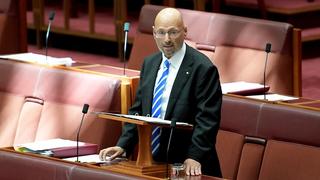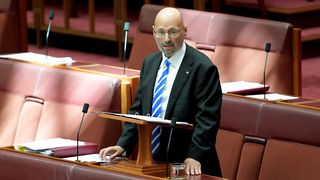The man once labelled "the real deputy PM" will now occupy the most important Australian ambassadorship in the world.
The Morrison Government's decision to appoint Liberal stalwart Arthur Sinodinos as Australian ambassador to the United States will see one of the country's most astute political operators head to Washington during a trying time in the Australia-US relationship.
Not his first brush with the US
As John Howard's chief of staff from 1997-2006, Mr Sinodinos had a central seat at the table through some highs and lows in the Australia-US alliance.
The decision to appoint Arthur Sinodinos as Australian ambassador to the United States will see one of the country's most astute political operators head to Washington during a trying time in the Australia-US relationship.
There was the frosty relationship between President Clinton and Mr Howard, not helped by a stoush over Australian lamb exports. Then there was the outcry when the United States would not commit troops for the UN-backed intervention in East Timor.
Mr Howard shared a warmer relationship with George W Bush. This brought about the Australia-US Free Trade Agreement in 2005, but also our involvement in Iraq, which was resoundingly unpopular with the Australian public.
Mr Sinodinos's experience during these difficult periods will serve him well at White Oaks.

The Trump challenge
In the Trump era in Washington, relationships drive policy.
In most prior administrations, decisions entailed a multi-agency process. The Obama administration's decision on US troop numbers in the Middle East, for example, involved the Department of State, Department of Defence, multiple intelligence agencies, and a whole cadre of national security council personnel.
While these disparate voices are by no means gone, they are certainly less relevant.
In the Trump administration, major decisions are often only dependent on one person: the President.
And after two and a half years in office and the departure of staffers known for tempering him, Mr Trump is more confident in his decision-making than ever.
Joe Hockey has, by all accounts, done a masterful job of responding to this new reality.
Last month, Mr Hockey delivered the White House US trade representative, chief of staff, chief economic adviser and deputy chief of staff to a meeting with senior Australian business leaders. This is no small feat for the 14th largest economy in the world.
He established critical relationships with senior levels of the Trump administration, including Mr Trump himself.
Last month, Mr Hockey delivered the White House US trade representative, chief of staff, chief economic adviser and deputy chief of staff to a meeting with senior Australian business leaders. This is no small feat for the 14th largest economy in the world.
Mr Hockey's American counterpart, the recently-appointed Arthur Culvahouse, has a similar gravitas to Mr Sinodinos and brings a personal line of communication with the Trump Administration to Canberra.
Trump not happy with Australia
Unfortunately for Mr Sinodinos, he enters the role at a challenging time.
Mr Trump is not happy with Australia's role in bringing about the Mueller investigation, which included Australian High Commissioner to the UK, Alexander Downer, reporting his conversation with a Trump official to the FBI in 2016.
The President has asked Attorney-General William Barr to investigate Australia's role in the "witch hunt", a move that's been criticised by some members of US Congress.
Mr Sinodinos will have to hope that Mr Hockey has smoothed over the tensions by the time he heads to Washington early next year.
But Trump's era could end…
In the longer term, Mr Sinodinos will need to build relations with both sides of the aisle, with the House controlled by Democrats and the 2020 presidential election looming. He will need to be prepared for both a Trump re-election and a Democratic president.
Fortunately, there is some precedence at White Oaks for how to do this.
As Australian ambassador, Kim Beazley (2010-2016), presided over the last US presidential re-election campaign in 2012.
While the polling favoured Mr Obama, Mr Beazley made sure to add to his local hires a well-connected Republican who had previously worked for Mitt Romney and President George W Bush.
This afforded him strong links to the GOP candidate as well as a former Republican administration and all the corresponding staff that came with it — who would likely be re-hired in the event of a Romney win.
Mr Romney did not go on to win, but it didn't hurt to have a GOP contact while the Republicans had control of the House for six of the eight years of the Obama presidency.
Experienced ambassadors a blessing
There remains an aura of politics surrounding Mr Sinodinos's appointment, but ambassadorial postings in Washington and Canberra will continue to be filled by dependable and experienced figures.
In the era of Mr Trump, great power competition between the US and China, and ever more demands on the US-Australian alliance, the appointment of both Arthurs is a welcome development.







